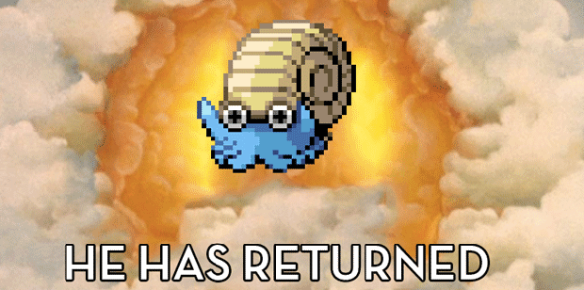The Internet is a strange place. No, seriously—the Internet is weird, man. A couple of years ago, a social experiment took place that proved, beyond all shadow of possible doubt, that the Internet is really freaking weird.
This experiment, which enlisted hundreds of thousands of participants and amassed many millions of views, pitted anarchy against democracy, wove a surreal narrative of loss and victory, and gave rise to a god.
I speak of Twitch Plays Pokémon, that epic microcosm of Internet weirdness.
You can find the whole story on Wikipedia, so I’ll provide an abridged version. An anonymous programmer launched a “social experiment” on Twitch, a video streaming website. The experiment streamed a version of an old Nintendo Game Boy game, Pokémon Red, which the programmer modified to be controlled entirely by commands typed into the stream’s chat room.
Anyone could join the crowd playing the game by typing in commands, which the game carried out one at a time. As days passed and Twitch Plays Pokémon went viral, thousands of people participated, all typing in commands at the same time to play the game. Chaos and anarchy reigned. It was nuts.
The difficulties of thousands of people all controlling a game at once soon became obvious. Insignificant obstacles such as ledges became insurmountable setbacks. New Pokémon were caught and released more or less at random. (For those who don’t know, the game revolves around catching, training, and battling friendly monsters called Pokémon.)
As the days wore on, the stubbornness of sincere players was matched against the sabotage of online trolls. Tweaks were made to Twitch Plays Pokémon to inject elements of democracy into the chaos, to the relief of some and the ire of others. Factions of players rose to support either side. Anarchy and democracy were each assigned specific Pokémon as emblems, and both factions fought for control of the game.
The actions of the game’s protagonist, Red, were understandably random and erratic. For example, due to the conflicting commands that poured into the game, Red frequently checked a useless item called the Helix Fossil during battles instead of fighting. This gave rise to the in-joke among players that he was consulting it for guidance. In turn, this led to the concept of the Helix Fossil as an idol or deity.
When the Fossil was finally revived into a living Pokémon later in the game, players declared the rebirth of a god.
 As a narrative emerged from Twitch Plays Pokémon, players and viewers alike watched each new development with the obsessive interest of sports fans on the day of a big game. A number of valuable Pokémon were accidentally released in a debacle that became known as Bloody Sunday. New Pokémon were given names, backstories, and allegiances to the factions of Democracy or Anarchy. Memes, fan art, and in-jokes spread like goofy viruses.
As a narrative emerged from Twitch Plays Pokémon, players and viewers alike watched each new development with the obsessive interest of sports fans on the day of a big game. A number of valuable Pokémon were accidentally released in a debacle that became known as Bloody Sunday. New Pokémon were given names, backstories, and allegiances to the factions of Democracy or Anarchy. Memes, fan art, and in-jokes spread like goofy viruses.
All the while, dedicated players kept typing commands into the experiment’s chat box. Red inched ever closer to victory, persevering through all mishaps. Even the loss of the Helix Fossil, his guiding deity, didn’t faze him.
At last, Twitch Plays Pokémon ended in spectacular fashion—Twitch finished Pokémon.
I was vaguely aware of Twitch Plays Pokémon as it unfolded, but never wasted time watching Red’s halting progress through the game. A few days ago, however, I took time to read a brief history of the event, and was struck by its glorious weirdness.
In a way, Twitch Plays Pokémon is a perfect microcosm of many aspects of Internet culture. It was random, unpredictable, and packed with memes and wacky humor. Like YouTube or Wikipedia, it was driven by the involvement of ordinary people. It spawned endless conflicts. Finally, it inspired many intelligent people to treat something totally inane with resolute dedication and seriousness.
After playing Pokémon Red, that Twitch channel went on to play (and replay) many other Pokémon games. I’m pretty sure the Twitch Plays Pokémon project is still going, albeit with a diminished audience. Now that the novelty has worn off, most of the viewers and players have moved on to new things. There are always new things.
After all, this is the Internet.
This post was originally published on April 13, 2016. TMTF shall return with new posts on Monday, September 5!


![Twitch Plays Pokémon [GIF]](https://typewritermonkeys.files.wordpress.com/2016/04/twitch-plays-pokc3a9mon-gif.gif?w=601&h=347)
